Impact of Climate Change on Indigenous Australians' Health
VerifiedAdded on 2023/06/11
|6
|1993
|458
Essay
AI Summary
This essay examines the multifaceted impacts of climate change on the health and well-being of Aboriginal and Torres Strait Islander peoples in Australia. It highlights how rising temperatures, increased risk of diseases, and the potential for floods exacerbate existing health inequalities, impacting food security, access to healthcare, and overall quality of life. The essay explores the social and emotional consequences of climate change, including displacement and financial burdens, and discusses the importance of culturally appropriate healthcare services and policy implications aimed at mitigating these adverse effects. It concludes by emphasizing the urgent need for comprehensive strategies to protect the health and well-being of Aboriginal and Torres Strait Islander communities in the face of climate change, and Desklib provides access to similar essays and study resources.
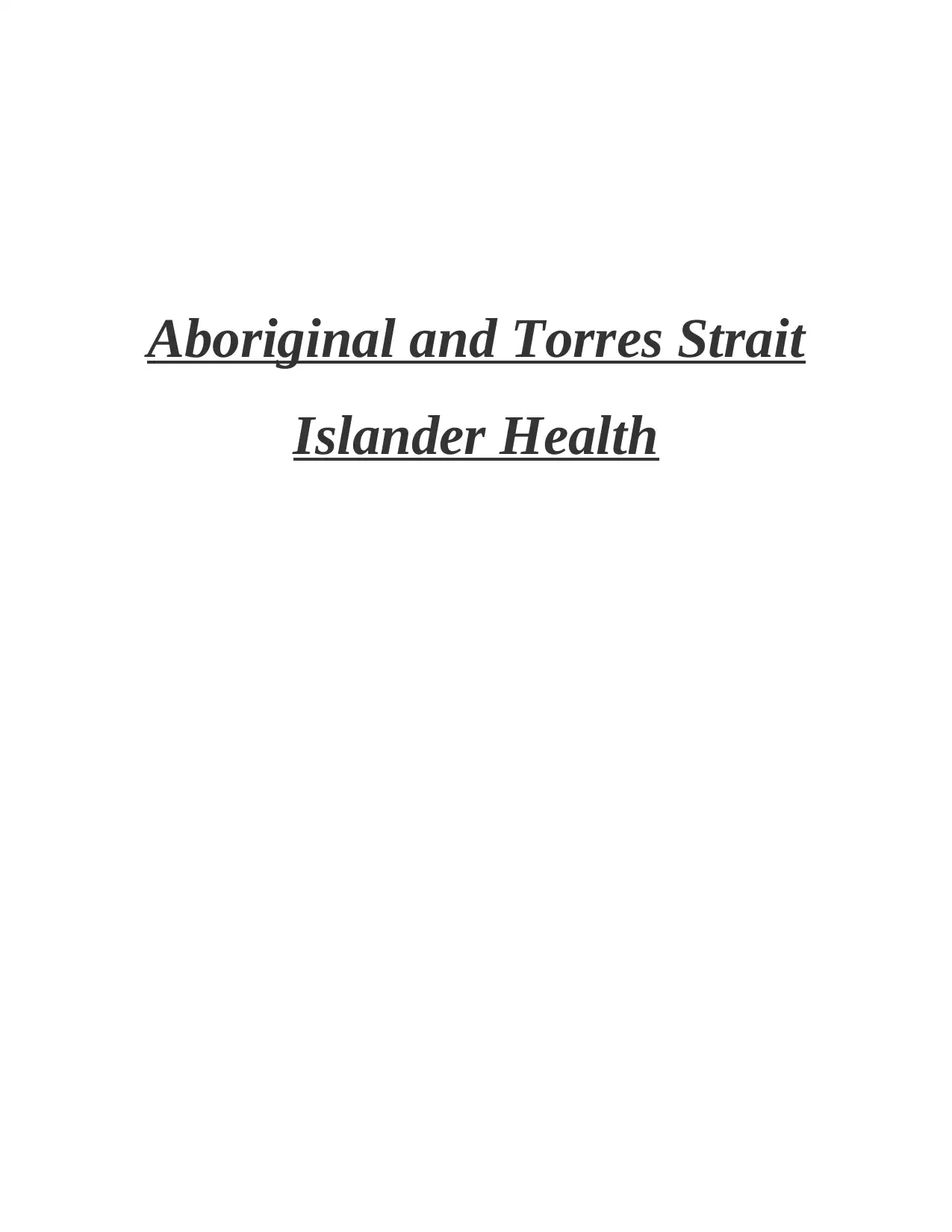
Aboriginal and Torres Strait
Islander Health
Islander Health
Paraphrase This Document
Need a fresh take? Get an instant paraphrase of this document with our AI Paraphraser
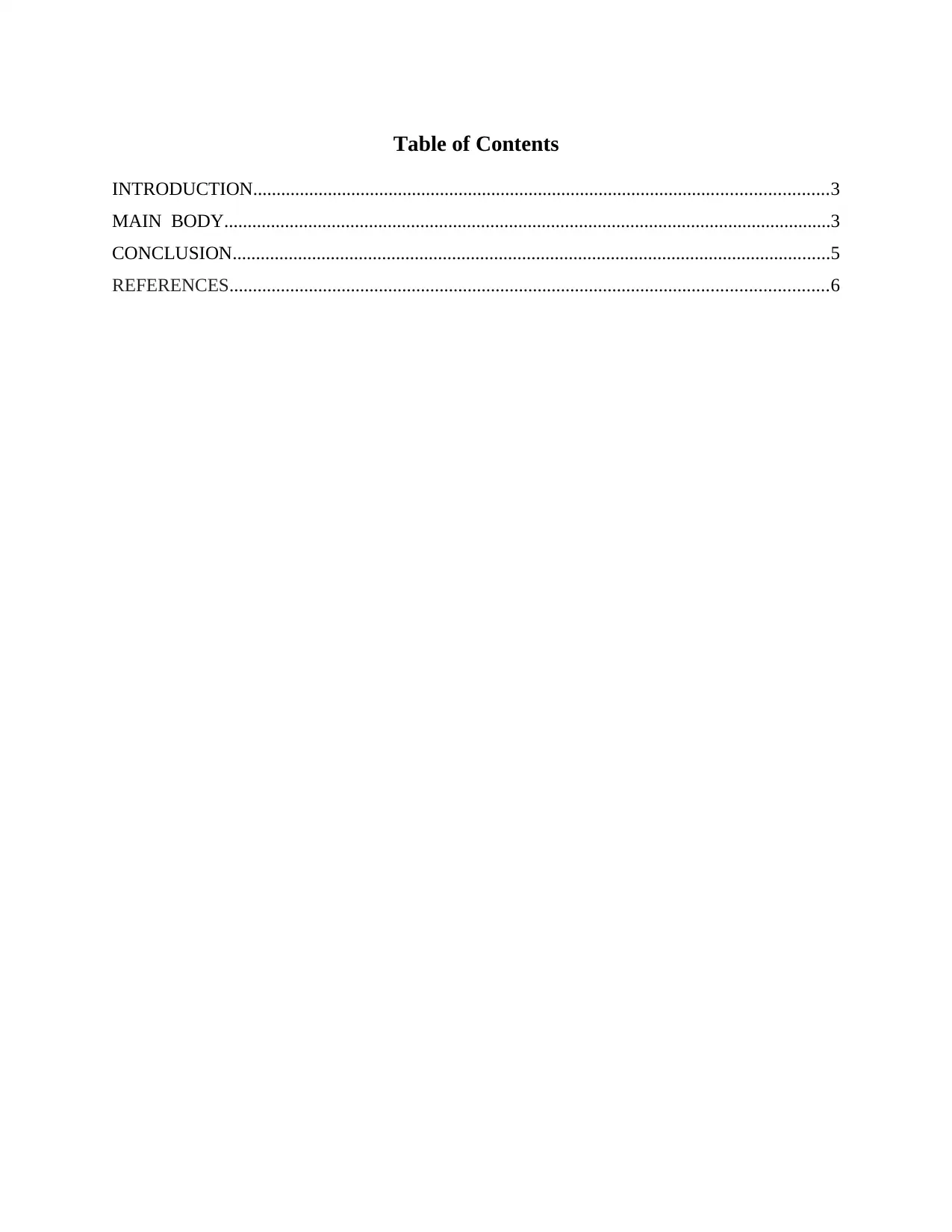
Table of Contents
INTRODUCTION...........................................................................................................................3
MAIN BODY..................................................................................................................................3
CONCLUSION................................................................................................................................5
REFERENCES................................................................................................................................6
INTRODUCTION...........................................................................................................................3
MAIN BODY..................................................................................................................................3
CONCLUSION................................................................................................................................5
REFERENCES................................................................................................................................6
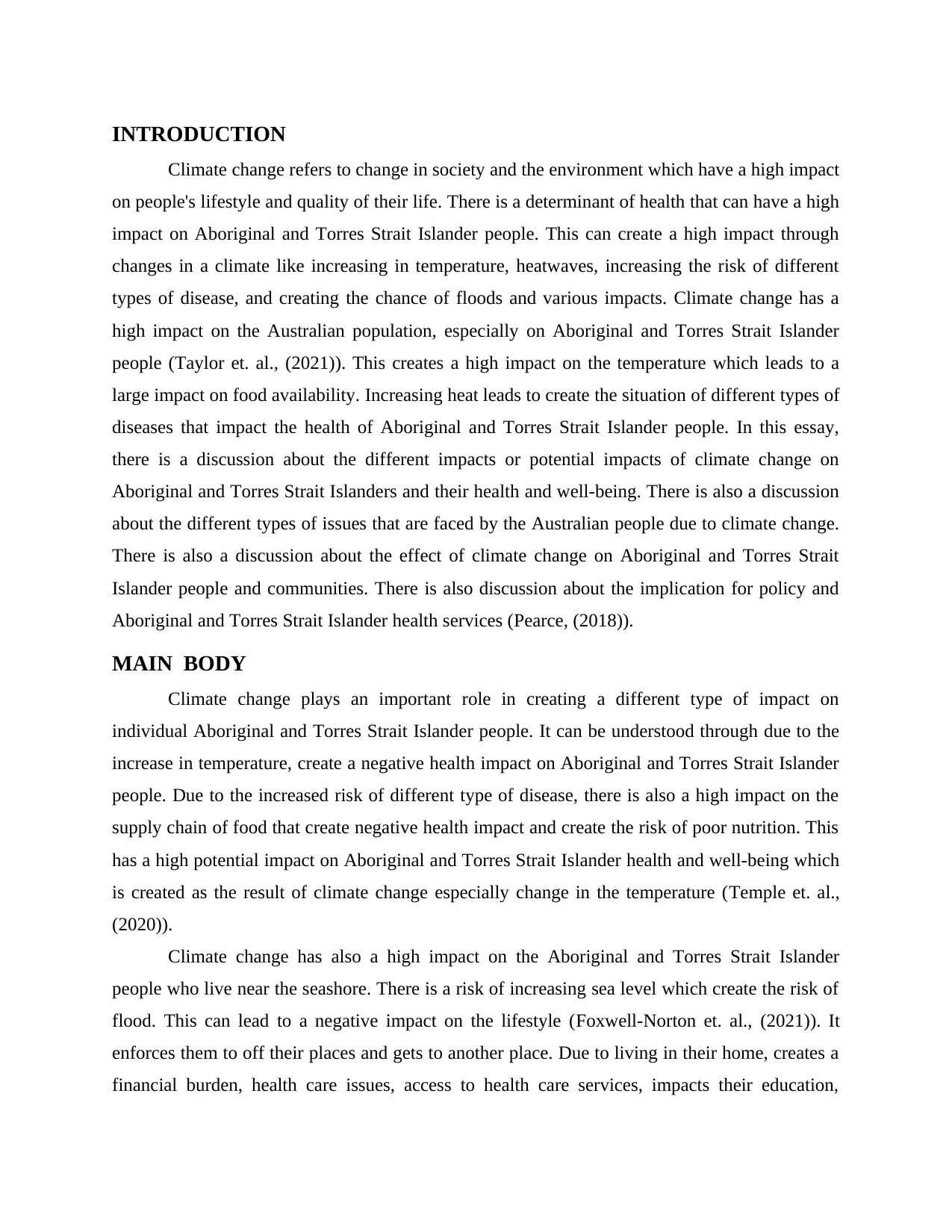
INTRODUCTION
Climate change refers to change in society and the environment which have a high impact
on people's lifestyle and quality of their life. There is a determinant of health that can have a high
impact on Aboriginal and Torres Strait Islander people. This can create a high impact through
changes in a climate like increasing in temperature, heatwaves, increasing the risk of different
types of disease, and creating the chance of floods and various impacts. Climate change has a
high impact on the Australian population, especially on Aboriginal and Torres Strait Islander
people (Taylor et. al., (2021)). This creates a high impact on the temperature which leads to a
large impact on food availability. Increasing heat leads to create the situation of different types of
diseases that impact the health of Aboriginal and Torres Strait Islander people. In this essay,
there is a discussion about the different impacts or potential impacts of climate change on
Aboriginal and Torres Strait Islanders and their health and well-being. There is also a discussion
about the different types of issues that are faced by the Australian people due to climate change.
There is also a discussion about the effect of climate change on Aboriginal and Torres Strait
Islander people and communities. There is also discussion about the implication for policy and
Aboriginal and Torres Strait Islander health services (Pearce, (2018)).
MAIN BODY
Climate change plays an important role in creating a different type of impact on
individual Aboriginal and Torres Strait Islander people. It can be understood through due to the
increase in temperature, create a negative health impact on Aboriginal and Torres Strait Islander
people. Due to the increased risk of different type of disease, there is also a high impact on the
supply chain of food that create negative health impact and create the risk of poor nutrition. This
has a high potential impact on Aboriginal and Torres Strait Islander health and well-being which
is created as the result of climate change especially change in the temperature (Temple et. al.,
(2020)).
Climate change has also a high impact on the Aboriginal and Torres Strait Islander
people who live near the seashore. There is a risk of increasing sea level which create the risk of
flood. This can lead to a negative impact on the lifestyle (Foxwell-Norton et. al., (2021)). It
enforces them to off their places and gets to another place. Due to living in their home, creates a
financial burden, health care issues, access to health care services, impacts their education,
Climate change refers to change in society and the environment which have a high impact
on people's lifestyle and quality of their life. There is a determinant of health that can have a high
impact on Aboriginal and Torres Strait Islander people. This can create a high impact through
changes in a climate like increasing in temperature, heatwaves, increasing the risk of different
types of disease, and creating the chance of floods and various impacts. Climate change has a
high impact on the Australian population, especially on Aboriginal and Torres Strait Islander
people (Taylor et. al., (2021)). This creates a high impact on the temperature which leads to a
large impact on food availability. Increasing heat leads to create the situation of different types of
diseases that impact the health of Aboriginal and Torres Strait Islander people. In this essay,
there is a discussion about the different impacts or potential impacts of climate change on
Aboriginal and Torres Strait Islanders and their health and well-being. There is also a discussion
about the different types of issues that are faced by the Australian people due to climate change.
There is also a discussion about the effect of climate change on Aboriginal and Torres Strait
Islander people and communities. There is also discussion about the implication for policy and
Aboriginal and Torres Strait Islander health services (Pearce, (2018)).
MAIN BODY
Climate change plays an important role in creating a different type of impact on
individual Aboriginal and Torres Strait Islander people. It can be understood through due to the
increase in temperature, create a negative health impact on Aboriginal and Torres Strait Islander
people. Due to the increased risk of different type of disease, there is also a high impact on the
supply chain of food that create negative health impact and create the risk of poor nutrition. This
has a high potential impact on Aboriginal and Torres Strait Islander health and well-being which
is created as the result of climate change especially change in the temperature (Temple et. al.,
(2020)).
Climate change has also a high impact on the Aboriginal and Torres Strait Islander
people who live near the seashore. There is a risk of increasing sea level which create the risk of
flood. This can lead to a negative impact on the lifestyle (Foxwell-Norton et. al., (2021)). It
enforces them to off their places and gets to another place. Due to living in their home, creates a
financial burden, health care issues, access to health care services, impacts their education,
⊘ This is a preview!⊘
Do you want full access?
Subscribe today to unlock all pages.

Trusted by 1+ million students worldwide
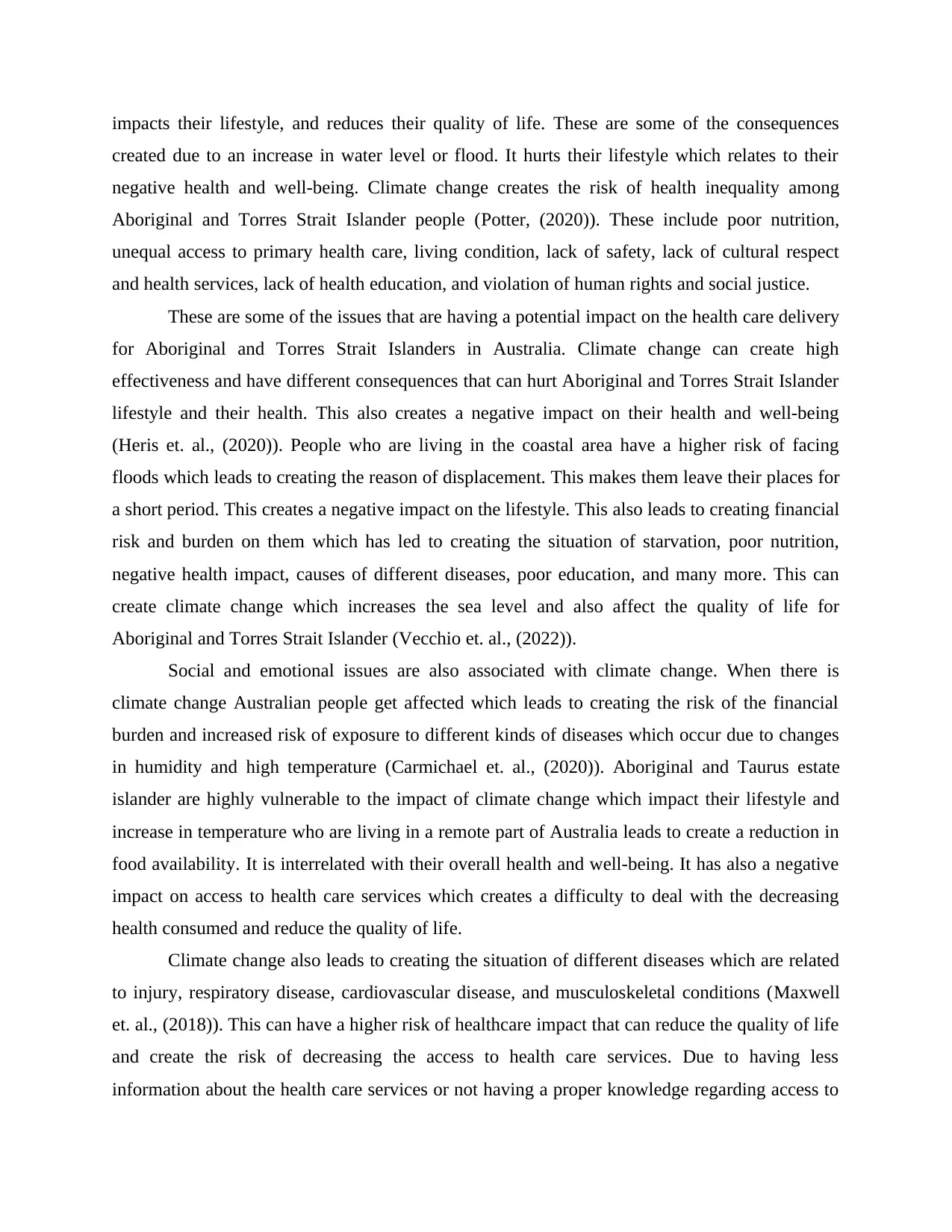
impacts their lifestyle, and reduces their quality of life. These are some of the consequences
created due to an increase in water level or flood. It hurts their lifestyle which relates to their
negative health and well-being. Climate change creates the risk of health inequality among
Aboriginal and Torres Strait Islander people (Potter, (2020)). These include poor nutrition,
unequal access to primary health care, living condition, lack of safety, lack of cultural respect
and health services, lack of health education, and violation of human rights and social justice.
These are some of the issues that are having a potential impact on the health care delivery
for Aboriginal and Torres Strait Islanders in Australia. Climate change can create high
effectiveness and have different consequences that can hurt Aboriginal and Torres Strait Islander
lifestyle and their health. This also creates a negative impact on their health and well-being
(Heris et. al., (2020)). People who are living in the coastal area have a higher risk of facing
floods which leads to creating the reason of displacement. This makes them leave their places for
a short period. This creates a negative impact on the lifestyle. This also leads to creating financial
risk and burden on them which has led to creating the situation of starvation, poor nutrition,
negative health impact, causes of different diseases, poor education, and many more. This can
create climate change which increases the sea level and also affect the quality of life for
Aboriginal and Torres Strait Islander (Vecchio et. al., (2022)).
Social and emotional issues are also associated with climate change. When there is
climate change Australian people get affected which leads to creating the risk of the financial
burden and increased risk of exposure to different kinds of diseases which occur due to changes
in humidity and high temperature (Carmichael et. al., (2020)). Aboriginal and Taurus estate
islander are highly vulnerable to the impact of climate change which impact their lifestyle and
increase in temperature who are living in a remote part of Australia leads to create a reduction in
food availability. It is interrelated with their overall health and well-being. It has also a negative
impact on access to health care services which creates a difficulty to deal with the decreasing
health consumed and reduce the quality of life.
Climate change also leads to creating the situation of different diseases which are related
to injury, respiratory disease, cardiovascular disease, and musculoskeletal conditions (Maxwell
et. al., (2018)). This can have a higher risk of healthcare impact that can reduce the quality of life
and create the risk of decreasing the access to health care services. Due to having less
information about the health care services or not having a proper knowledge regarding access to
created due to an increase in water level or flood. It hurts their lifestyle which relates to their
negative health and well-being. Climate change creates the risk of health inequality among
Aboriginal and Torres Strait Islander people (Potter, (2020)). These include poor nutrition,
unequal access to primary health care, living condition, lack of safety, lack of cultural respect
and health services, lack of health education, and violation of human rights and social justice.
These are some of the issues that are having a potential impact on the health care delivery
for Aboriginal and Torres Strait Islanders in Australia. Climate change can create high
effectiveness and have different consequences that can hurt Aboriginal and Torres Strait Islander
lifestyle and their health. This also creates a negative impact on their health and well-being
(Heris et. al., (2020)). People who are living in the coastal area have a higher risk of facing
floods which leads to creating the reason of displacement. This makes them leave their places for
a short period. This creates a negative impact on the lifestyle. This also leads to creating financial
risk and burden on them which has led to creating the situation of starvation, poor nutrition,
negative health impact, causes of different diseases, poor education, and many more. This can
create climate change which increases the sea level and also affect the quality of life for
Aboriginal and Torres Strait Islander (Vecchio et. al., (2022)).
Social and emotional issues are also associated with climate change. When there is
climate change Australian people get affected which leads to creating the risk of the financial
burden and increased risk of exposure to different kinds of diseases which occur due to changes
in humidity and high temperature (Carmichael et. al., (2020)). Aboriginal and Taurus estate
islander are highly vulnerable to the impact of climate change which impact their lifestyle and
increase in temperature who are living in a remote part of Australia leads to create a reduction in
food availability. It is interrelated with their overall health and well-being. It has also a negative
impact on access to health care services which creates a difficulty to deal with the decreasing
health consumed and reduce the quality of life.
Climate change also leads to creating the situation of different diseases which are related
to injury, respiratory disease, cardiovascular disease, and musculoskeletal conditions (Maxwell
et. al., (2018)). This can have a higher risk of healthcare impact that can reduce the quality of life
and create the risk of decreasing the access to health care services. Due to having less
information about the health care services or not having a proper knowledge regarding access to
Paraphrase This Document
Need a fresh take? Get an instant paraphrase of this document with our AI Paraphraser
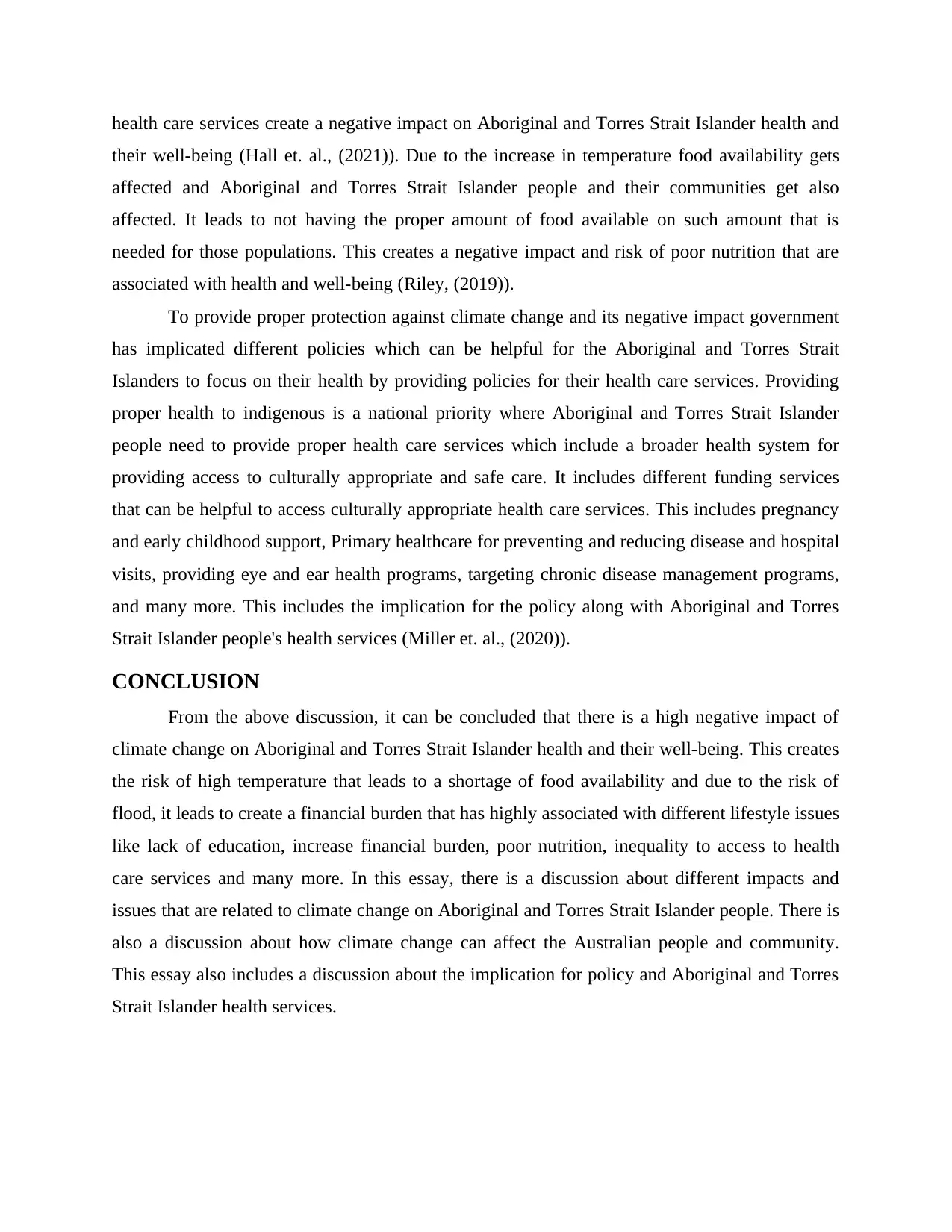
health care services create a negative impact on Aboriginal and Torres Strait Islander health and
their well-being (Hall et. al., (2021)). Due to the increase in temperature food availability gets
affected and Aboriginal and Torres Strait Islander people and their communities get also
affected. It leads to not having the proper amount of food available on such amount that is
needed for those populations. This creates a negative impact and risk of poor nutrition that are
associated with health and well-being (Riley, (2019)).
To provide proper protection against climate change and its negative impact government
has implicated different policies which can be helpful for the Aboriginal and Torres Strait
Islanders to focus on their health by providing policies for their health care services. Providing
proper health to indigenous is a national priority where Aboriginal and Torres Strait Islander
people need to provide proper health care services which include a broader health system for
providing access to culturally appropriate and safe care. It includes different funding services
that can be helpful to access culturally appropriate health care services. This includes pregnancy
and early childhood support, Primary healthcare for preventing and reducing disease and hospital
visits, providing eye and ear health programs, targeting chronic disease management programs,
and many more. This includes the implication for the policy along with Aboriginal and Torres
Strait Islander people's health services (Miller et. al., (2020)).
CONCLUSION
From the above discussion, it can be concluded that there is a high negative impact of
climate change on Aboriginal and Torres Strait Islander health and their well-being. This creates
the risk of high temperature that leads to a shortage of food availability and due to the risk of
flood, it leads to create a financial burden that has highly associated with different lifestyle issues
like lack of education, increase financial burden, poor nutrition, inequality to access to health
care services and many more. In this essay, there is a discussion about different impacts and
issues that are related to climate change on Aboriginal and Torres Strait Islander people. There is
also a discussion about how climate change can affect the Australian people and community.
This essay also includes a discussion about the implication for policy and Aboriginal and Torres
Strait Islander health services.
their well-being (Hall et. al., (2021)). Due to the increase in temperature food availability gets
affected and Aboriginal and Torres Strait Islander people and their communities get also
affected. It leads to not having the proper amount of food available on such amount that is
needed for those populations. This creates a negative impact and risk of poor nutrition that are
associated with health and well-being (Riley, (2019)).
To provide proper protection against climate change and its negative impact government
has implicated different policies which can be helpful for the Aboriginal and Torres Strait
Islanders to focus on their health by providing policies for their health care services. Providing
proper health to indigenous is a national priority where Aboriginal and Torres Strait Islander
people need to provide proper health care services which include a broader health system for
providing access to culturally appropriate and safe care. It includes different funding services
that can be helpful to access culturally appropriate health care services. This includes pregnancy
and early childhood support, Primary healthcare for preventing and reducing disease and hospital
visits, providing eye and ear health programs, targeting chronic disease management programs,
and many more. This includes the implication for the policy along with Aboriginal and Torres
Strait Islander people's health services (Miller et. al., (2020)).
CONCLUSION
From the above discussion, it can be concluded that there is a high negative impact of
climate change on Aboriginal and Torres Strait Islander health and their well-being. This creates
the risk of high temperature that leads to a shortage of food availability and due to the risk of
flood, it leads to create a financial burden that has highly associated with different lifestyle issues
like lack of education, increase financial burden, poor nutrition, inequality to access to health
care services and many more. In this essay, there is a discussion about different impacts and
issues that are related to climate change on Aboriginal and Torres Strait Islander people. There is
also a discussion about how climate change can affect the Australian people and community.
This essay also includes a discussion about the implication for policy and Aboriginal and Torres
Strait Islander health services.
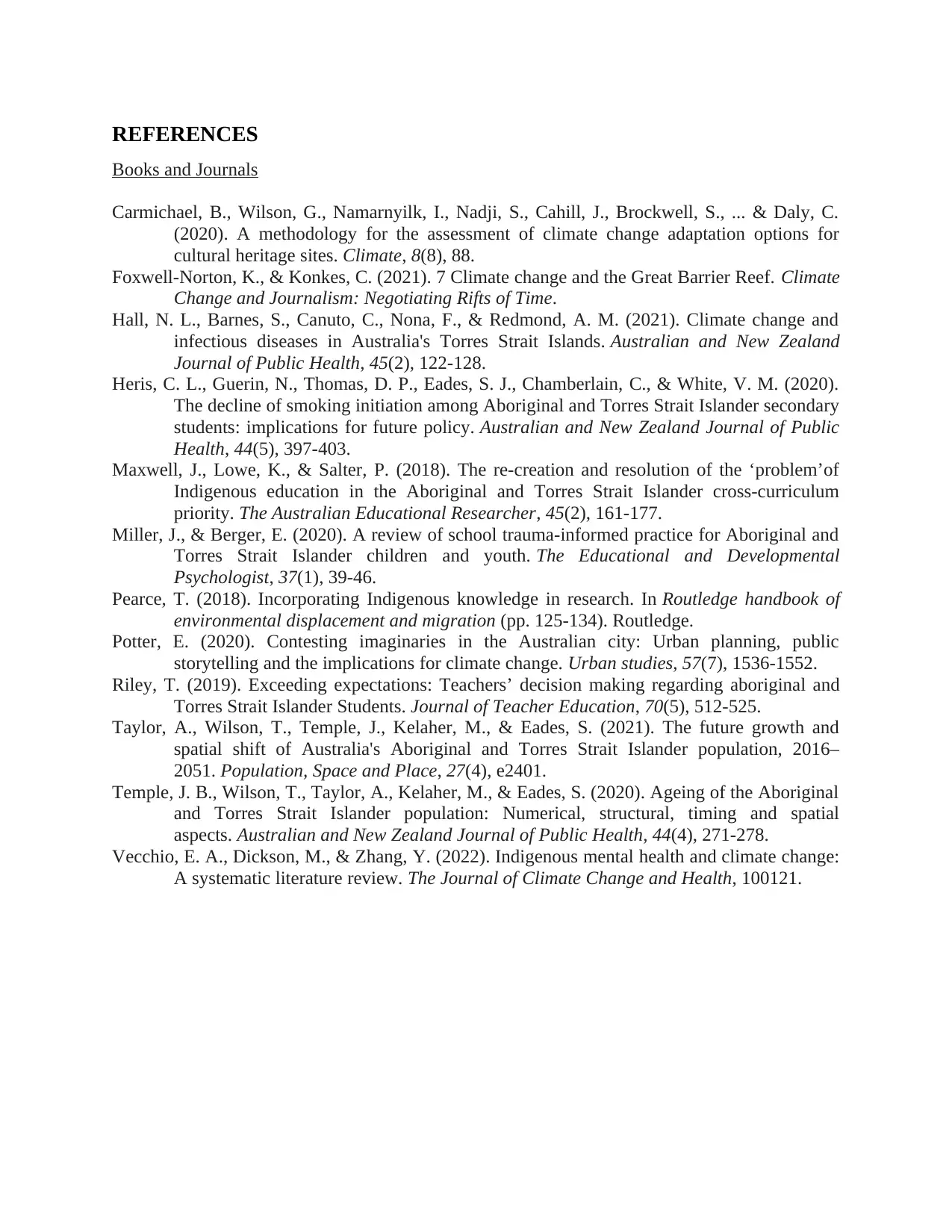
REFERENCES
Books and Journals
Carmichael, B., Wilson, G., Namarnyilk, I., Nadji, S., Cahill, J., Brockwell, S., ... & Daly, C.
(2020). A methodology for the assessment of climate change adaptation options for
cultural heritage sites. Climate, 8(8), 88.
Foxwell-Norton, K., & Konkes, C. (2021). 7 Climate change and the Great Barrier Reef. Climate
Change and Journalism: Negotiating Rifts of Time.
Hall, N. L., Barnes, S., Canuto, C., Nona, F., & Redmond, A. M. (2021). Climate change and
infectious diseases in Australia's Torres Strait Islands. Australian and New Zealand
Journal of Public Health, 45(2), 122-128.
Heris, C. L., Guerin, N., Thomas, D. P., Eades, S. J., Chamberlain, C., & White, V. M. (2020).
The decline of smoking initiation among Aboriginal and Torres Strait Islander secondary
students: implications for future policy. Australian and New Zealand Journal of Public
Health, 44(5), 397-403.
Maxwell, J., Lowe, K., & Salter, P. (2018). The re-creation and resolution of the ‘problem’of
Indigenous education in the Aboriginal and Torres Strait Islander cross-curriculum
priority. The Australian Educational Researcher, 45(2), 161-177.
Miller, J., & Berger, E. (2020). A review of school trauma-informed practice for Aboriginal and
Torres Strait Islander children and youth. The Educational and Developmental
Psychologist, 37(1), 39-46.
Pearce, T. (2018). Incorporating Indigenous knowledge in research. In Routledge handbook of
environmental displacement and migration (pp. 125-134). Routledge.
Potter, E. (2020). Contesting imaginaries in the Australian city: Urban planning, public
storytelling and the implications for climate change. Urban studies, 57(7), 1536-1552.
Riley, T. (2019). Exceeding expectations: Teachers’ decision making regarding aboriginal and
Torres Strait Islander Students. Journal of Teacher Education, 70(5), 512-525.
Taylor, A., Wilson, T., Temple, J., Kelaher, M., & Eades, S. (2021). The future growth and
spatial shift of Australia's Aboriginal and Torres Strait Islander population, 2016–
2051. Population, Space and Place, 27(4), e2401.
Temple, J. B., Wilson, T., Taylor, A., Kelaher, M., & Eades, S. (2020). Ageing of the Aboriginal
and Torres Strait Islander population: Numerical, structural, timing and spatial
aspects. Australian and New Zealand Journal of Public Health, 44(4), 271-278.
Vecchio, E. A., Dickson, M., & Zhang, Y. (2022). Indigenous mental health and climate change:
A systematic literature review. The Journal of Climate Change and Health, 100121.
Books and Journals
Carmichael, B., Wilson, G., Namarnyilk, I., Nadji, S., Cahill, J., Brockwell, S., ... & Daly, C.
(2020). A methodology for the assessment of climate change adaptation options for
cultural heritage sites. Climate, 8(8), 88.
Foxwell-Norton, K., & Konkes, C. (2021). 7 Climate change and the Great Barrier Reef. Climate
Change and Journalism: Negotiating Rifts of Time.
Hall, N. L., Barnes, S., Canuto, C., Nona, F., & Redmond, A. M. (2021). Climate change and
infectious diseases in Australia's Torres Strait Islands. Australian and New Zealand
Journal of Public Health, 45(2), 122-128.
Heris, C. L., Guerin, N., Thomas, D. P., Eades, S. J., Chamberlain, C., & White, V. M. (2020).
The decline of smoking initiation among Aboriginal and Torres Strait Islander secondary
students: implications for future policy. Australian and New Zealand Journal of Public
Health, 44(5), 397-403.
Maxwell, J., Lowe, K., & Salter, P. (2018). The re-creation and resolution of the ‘problem’of
Indigenous education in the Aboriginal and Torres Strait Islander cross-curriculum
priority. The Australian Educational Researcher, 45(2), 161-177.
Miller, J., & Berger, E. (2020). A review of school trauma-informed practice for Aboriginal and
Torres Strait Islander children and youth. The Educational and Developmental
Psychologist, 37(1), 39-46.
Pearce, T. (2018). Incorporating Indigenous knowledge in research. In Routledge handbook of
environmental displacement and migration (pp. 125-134). Routledge.
Potter, E. (2020). Contesting imaginaries in the Australian city: Urban planning, public
storytelling and the implications for climate change. Urban studies, 57(7), 1536-1552.
Riley, T. (2019). Exceeding expectations: Teachers’ decision making regarding aboriginal and
Torres Strait Islander Students. Journal of Teacher Education, 70(5), 512-525.
Taylor, A., Wilson, T., Temple, J., Kelaher, M., & Eades, S. (2021). The future growth and
spatial shift of Australia's Aboriginal and Torres Strait Islander population, 2016–
2051. Population, Space and Place, 27(4), e2401.
Temple, J. B., Wilson, T., Taylor, A., Kelaher, M., & Eades, S. (2020). Ageing of the Aboriginal
and Torres Strait Islander population: Numerical, structural, timing and spatial
aspects. Australian and New Zealand Journal of Public Health, 44(4), 271-278.
Vecchio, E. A., Dickson, M., & Zhang, Y. (2022). Indigenous mental health and climate change:
A systematic literature review. The Journal of Climate Change and Health, 100121.
⊘ This is a preview!⊘
Do you want full access?
Subscribe today to unlock all pages.

Trusted by 1+ million students worldwide
1 out of 6
Related Documents
Your All-in-One AI-Powered Toolkit for Academic Success.
+13062052269
info@desklib.com
Available 24*7 on WhatsApp / Email
![[object Object]](/_next/static/media/star-bottom.7253800d.svg)
Unlock your academic potential
Copyright © 2020–2025 A2Z Services. All Rights Reserved. Developed and managed by ZUCOL.





